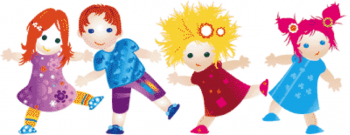Month 48
Brain research underscores what educators have long argued: early social and emotional experiences are the seeds of human intelligence. Each child’s neural circuits are carving highways in the brain where future learning will travel with ease.

Several experimental studies show that school kids pay more attention to academics after they’ve had a recess--an unstructured break in which kids are free to play without direction from adults (see Pellegrini and Holmes 2006 for a review).
There is some circumstantial evidence, too: Chinese and Japanese students, who are among the best achievers in the world, attend schools that provide short breaks every 50 minutes (Stevenson and Lee 1990). In a small study of 4-5 year olds, researchers found that recesses of 10 or 20 minutes enhanced classroom attention. Recesses as long as 30 minutes had the opposite effect (Pelligrini and Holmes 2006).
How I think @ 48 months
Your child’s comprehension is now at a 3-4 word level, he can process complex sentence structures and understands 1500 – 2000 words. As he reaches 4-years old he can follow a command with 3 directions, can track a 6-word sentence and can retell a short story. He is making inferences and can understand the consequences of his and other people’s actions. His understanding of concepts and how his world works becomes more developed. Over his 4th year of life he will learn to understand many more abstract concepts.
Motor Development: Gross Motor Skills
• I have begun to coordinate movements to climb on a jungle gym or jump on a small trampoline
• I show greater perceptual judgment and awareness of own limitations and/or the consequences of unsafe behaviors
• I still need supervision crossing a street or protecting self in certain activities
Motor Development: Fine Motor Skills
• I can draw combinations of simple shapes; persons with at least four parts and objects that are recognizable to adults
• I can dress and undress without assistance
Language and Thinking Development
• I can express emotions through facial gestures and read others for body cues
• I copy behaviors (such as hand gestures) of older children or adults
• I can control volume of voice for periods of time if reminded; (I have begun to read context for social cues)
Social and Emotional Development
• I have begun to spontaneously offer things to others; as I want to please friends
• I compliment others on new clothing or shoes; show pleasure in having and being with friends
• I exhibit occasional outbursts of anger but am learning that negative acts bring negative sanctions; and I quickly begin to justify an aggressive act (“He hit me first”)
Activities
Disclaimer: This presents an overview of child development. It is important to keep in mind that the time frames presented are averages and some children may achieve various developmental milestones earlier or later than the average but still be within the normal range of development. This information is presented to help parents understand, at a high level, what to expect from their child. Any questions/concerns you may have about your child’s development should be shared with your doctor.




